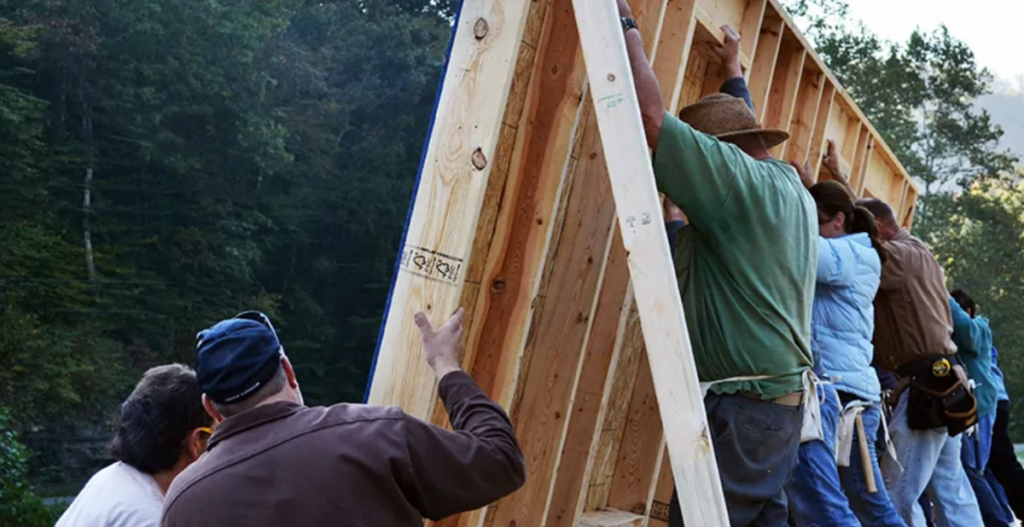The Housing Development Alliance in Hazard, Kentucky, found that volunteers referred by the Drug Court were some of their hardest workers. Now the nonprofit organization and others are creating an employment program to help those in addiction recovery get back on their feet.
In Hazard, Kentucky, the mission of the Housing Development Alliance is to build affordable homes for people in the community. With their new program, Hope Building, they are expanding that mission: to provide employment training for individuals in addiction recovery as they learn to construct affordable homes.
The program was inspired by the individuals in recovery from addiction who have volunteered with HDA. For each of the last seven years, 60 folks from the Perry County Drug Court have served with community building and repair projects. The Drug Court leadership says it is one of the best community service projects they do, and the construction team at HDA says those volunteers are some of their hardest working.
“There is almost something spiritual about building something,” says Scott McReynolds, HDA’s Executive Director. “It really fits well with the needs of those in recovery.”

When McReynolds approached the Drug Court about further ways to partner, he quickly understood how HDA could help. One of the greatest needs of individuals re-entering society after recovery is employment, so they recruited other partners and launched Hope Building. The job training and placement program is a collaboration between HDA, the Drug Court, Hickory Hills Recovery Center, Hazard Community and Technical College, and the Eastern Kentucky Concentrated Employment Program. It provides paid on-the-job training, part-time schooling towards a construction technology degree, and the chance to garner a quality job reference. Six trainees at a time will complete the approximately year-long program, with job placement assistance as part of the process.
Research is starting to show what advocates have known anecdotally: having a job makes a significant difference in long-term addiction recovery. Only part of that is financial. For people who have misused substances, the chance to make a positive contribution in their communities can bring healing and instill a sense of purpose. But for those in recovery, the challenge of finding employment is exacerbated. Some lack job skills or good work practices. Many have a criminal record. HDA and its partners hope to create a model of how to help those in recovery re-integrate into society.
In 2017, Kentucky had an opioid overdose rate almost twice the national average, according to the National Institute of Health. Few families are left untouched, and many individuals and organizations want to be part of the solution.
That includes regional non-profit Fahe, a collaborative network of over 50 locally-rooted non-profits, including Housing Development Alliance. After learning about the Hope Building project, Fahe developed a plan to instigate eight such home construction/recovery job training programs in other Appalachian communities. They are in the process of seeking funding for this expansion.
Fahe is currently launching a separate program that offers incentives for employers to hire individuals in recovery in six Kentucky counties. Transformational employment, as Fahe calls it, connects recovering individuals with meaningful work. “We want to partner with employers who are invested in our mission of eliminating persistent poverty and want to be part of social change in their communities,” says Jessie Hunt of Fahe. Transformational employers receive financial incentives, including reimbursement for the employee’s salary for the first six months, and mentorship opportunities with Rob Perez, a successful transformational employer and owner of DV8 Kitchen in Lexington.
Fahe is partnering with Addiction Recovery Care, a network of 19 treatment centers throughout the region that incorporates workforce training in its residential recovery program. Even with their job training program, the folks at Addiction Recovery have had difficulties placing their graduates in jobs. Hunt says regional employers see the need for this second chance and they often ask her where to start. “First, do not ask applicants their felony history,” she says. “Then, hire just one individual who is in recovery.”
While the term “transformational” refers to the newly hired employees, the employers just might find themselves transformed as well. A self-proclaimed construction geek who loves to build, McReynolds of HDA has had a shift in focus since working with those in recovery. “A decade ago, I would have said our mission is to build houses. Now, I believe we use the power of housing to transform lives and build a brighter future for the community. Home construction is a tool we use to accomplish a greater purpose.”
This article was originally published by The Daily Yonder.



